In the education system of New Zealand, a wānanga is a publicly-owned tertiary institution that provides education in a Māori cultural context. Section 162 of the New Zealand Education Act of 1989 specifies that wānanga resemble mainstream universities in many ways but expects them to be:

The University of New Zealand was New Zealand's sole degree-granting university from 1874 to 1961. It was a collegiate university embracing several constituent institutions at various locations around New Zealand. After it was dissolved in 1961 New Zealand had four independent degree-granting universities and two associated agricultural colleges: the University of Otago (Dunedin), University of Canterbury (Christchurch), University of Auckland (Auckland), Victoria University of Wellington (Wellington), Canterbury Agricultural College (Lincoln) and Massey Agricultural College.
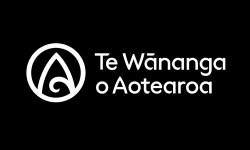
Te Wānanga o Aotearoa is a wānanga in New Zealand. The organisation was established to improve the social and economic well-being of those who had previously had negative experiences with the secondary education system. As a Māori-led organisation grounded in Māori values, Te Wānanga o Aotearoa is committed to the revitalisation of Māori cultural knowledge. It is also focused on breaking inter-generational cycles of non-participation in tertiary education to reduce poverty and eliminate associated social issues. The organisation works towards ‘whānau transformation through education'.

Kura Kaupapa Māori are Māori-language immersion schools in New Zealand where the philosophy and practice reflect Māori cultural values with the aim of revitalising Māori language, knowledge and culture. The term kaupapa Māori is used popularly by Māori to mean any particular plan of action created by Māori to express Māori aspirations, values and principles.

Sir Mason Harold Durie is a New Zealand professor of Māori Studies and research academic at Massey University. He is known for his contributions to Māori health. In 2020, he was appointed to the Order of New Zealand, the highest honour in New Zealand's royal honours system.

Sir Harawira Tiri Gardiner was a New Zealand soldier, public servant, and writer. He was Māori, of Ngāti Awa, Ngāti Pikiao, Whakatōhea, and Te Whānau-ā-Apanui descent.

Sir "Sidney" Hirini Moko Haerewa Mead is a New Zealand anthropologist, historian, artist, teacher, writer and prominent Māori leader. Initially training as a teacher and artist, Mead taught in many schools in the East Coast and Bay of Plenty regions, and later served as principal of several schools. After earning his PhD in 1968, he taught anthropology in several universities abroad. He returned to New Zealand in 1977 and established the first Māori studies department in the country. Mead later became a prominent Māori advocate and leader, acting in negotiations on behalf of several tribes and sitting on numerous advisory boards. He has also written extensively on Māori culture. He is currently the chair of the council of Te Whare Wānanga o Awanuiārangi.
Diggeress Rangituatahi Te Kanawa was a New Zealand Māori tohunga raranga of Ngati Maniapoto and Ngati Kinohaku descent. At the time of her death she was regarded as New Zealand's most renowned weaver.

Linda Tuhiwai Te Rina Smith was a professor of indigenous education at the University of Waikato in Hamilton, New Zealand and is now at Te Whare Wānanga o Awanuiārangi. The daughter of Hirini Moko Mead, she affiliates to the Ngāti Awa and Ngāti Porou iwi.
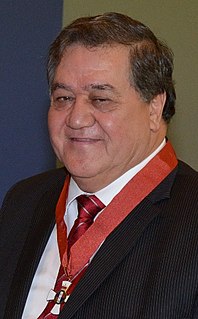
Graham Hingangaroa Smith is a New Zealand Māori academic and educationalist of Ngāti Porou, Ngāi Tahu, Ngāti Apa and Ngāti Kahungunu descent. He is a Fellow of the Royal Society Te Apārangi.

Tertiary education in New Zealand is provided by universities, institutes of technology and polytechnics, private training establishments, industry training organisations, and wānanga. It ranges from informal non-assessed community courses in schools through to undergraduate degrees and research-based postgraduate degrees. All post-compulsory education is regulated within the New Zealand Qualifications Framework, a unified system of national qualifications for schools, vocational education and training, and 'higher' education. The New Zealand Qualifications Authority (NZQA) is responsible for quality assuring all courses and tertiary education organisations other than universities. Under the Education Act 1989, The Committee on University Academic Programmes (CUAP) and the Academic Quality Agency (AQA) have delegated authority for quality assurance of university education. The Tertiary Education Commission (TEC) is responsible for administering the funding of tertiary education, primarily through negotiated investment plans with each funded organisation.
Wi Te Tau Pirika Taepa is a New Zealand ceramicist of Ngāti Pikiao, Te-Roro-o-Te-Rangi, Te Arawa and Te Āti Awa descent. He is recognised as a significant figure in contemporary New Zealand ceramics, and a leading figure in contemporary Māori clay art.
Te Wānanga o Raukawa is a Māori university wānanga in New Zealand, established in 1981. Based in Ōtaki, New Zealand, with smaller campuses in Auckland and Gisborne, the Wānanga was born out of a collaborative tribal desire or experiment known as Whakatupuranga Rua Mano or Generation 2000 to help bring Māori people back to their marae, revitalise the Māori language, plus develop Māori with the necessary tools and skills to empower them to succeed in this world while retaining the knowledge of their ancestors. All qualifications underpin a Māori world view and at diploma level and above include a specialisation, iwi and hapū studies and te reo Maōri studies.

Hinemoa Elder is a New Zealand youth forensic psychiatrist and former television presenter. She is a professor in indigenous research at Te Whare Wānanga o Awanuiārangi, a fellow of the Royal Australian and New Zealand College of Psychiatrists, and sits on the Māori Advisory Committee of the Centre for Brain Research - Rangahau Roro Aotearoa. She is of English and Māori descent, from Ngāti Kurī, Te Rarawa, Te Aupōuri and Ngāpuhi iwi.
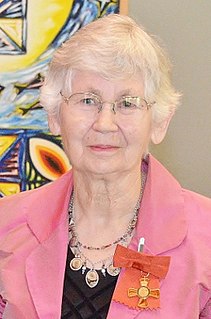
Jennifer Lillian Beck is a New Zealand writer of over 50 children’s books. Her work, often focusing on themes of history, peace and war, has won numerous prizes and awards. She lives in Auckland, New Zealand.
Mere Whaanga is a New Zealand writer, illustrator, historian, researcher and academic whose work includes bilingual picture books, history books and conference papers. Several of her books have been shortlisted for or won awards and she herself has received a number of awards, grants, fellowships and writing residencies. She lives in Māhia, Hawke's Bay.
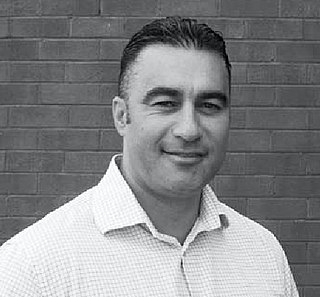
Te Kani R. Kingi is a New Zealand mental health academic, are Māori, of Ngāti Pukeko and Ngāti Awa descent and as of 2019 is a full professor at Te Whare Wānanga o Awanuiārangi.
Roka Pahewa Paora, née Swinton, QSM was a pioneer of the Māori language, developing materials to teach the language within a whakapapa framework.
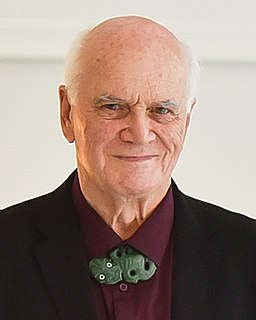
Raymond Henry "Sandy" Adsett is a New Zealand visual artist and educator. Of Māori descent, he affiliates to Ngāti Kahungunu and Ngāti Pāhauwera. He is acknowledged for championing the art of kōwhaiwhai painting, creating a context for the artform within the development of contemporary Māori art.













